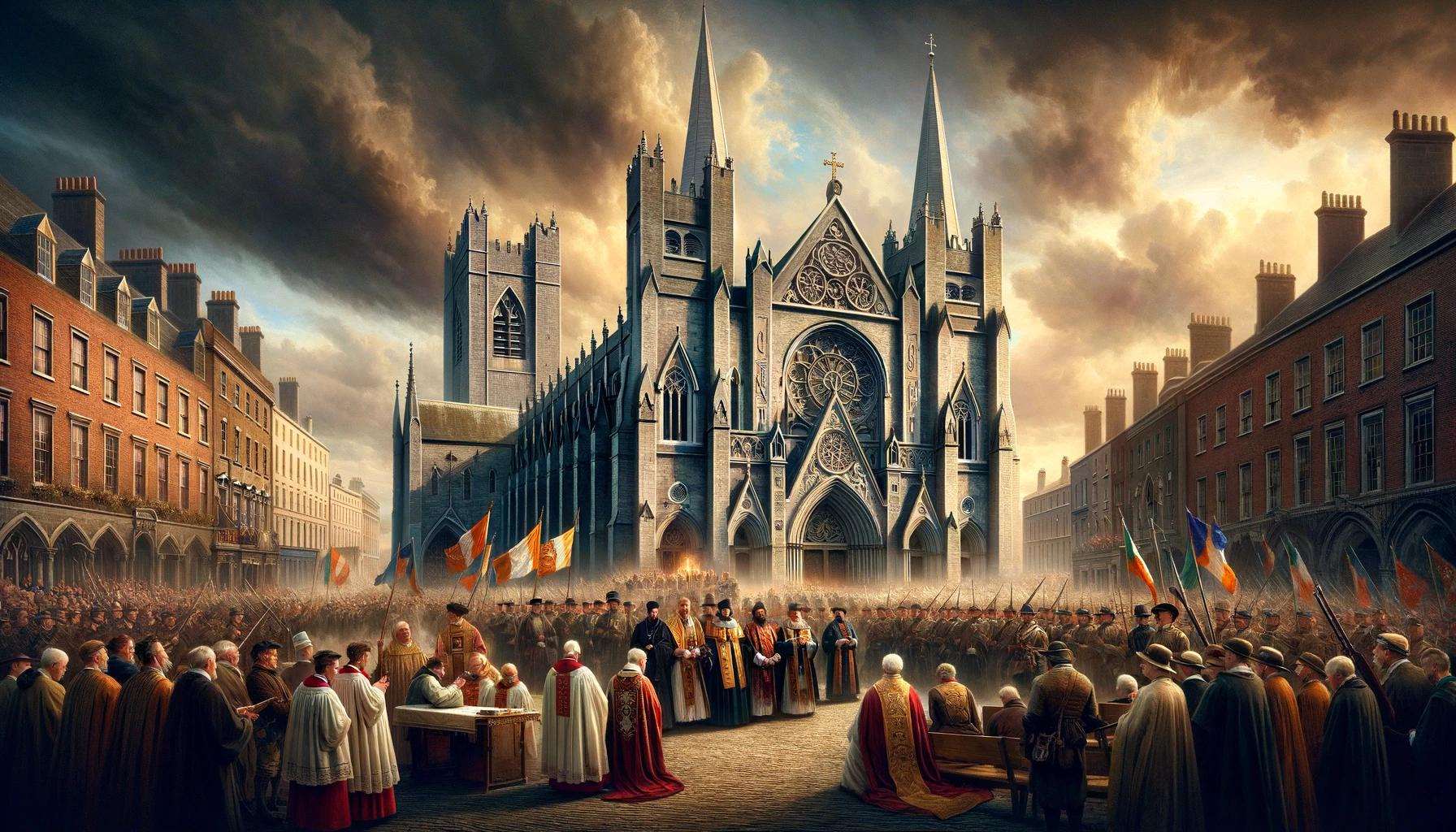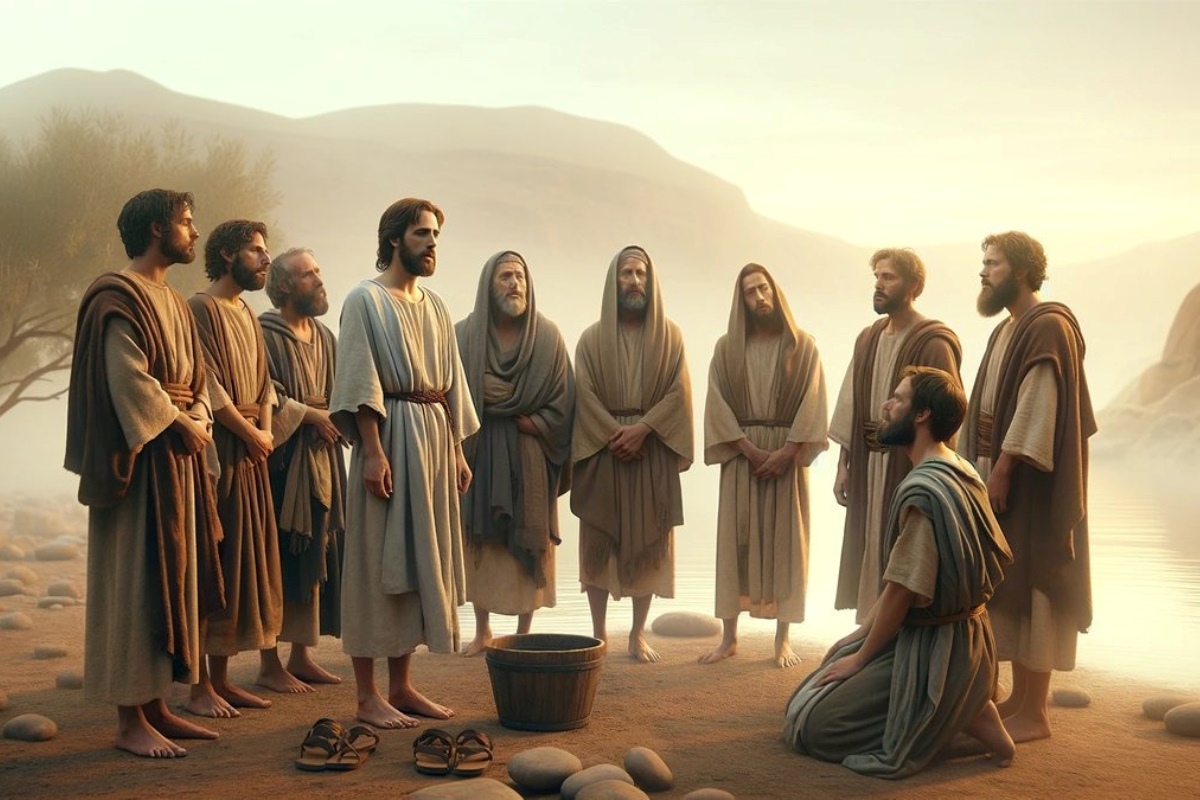Home>Theology and Spirituality>Who Created The Baptist Denomination


Theology and Spirituality
Who Created The Baptist Denomination
Published: February 21, 2024
Ericka Andersen, an editor at Christian.net, expertly merges digital strategy with content creation, focusing on faith and societal issues. Her communication skills enhance the platform's engaging narratives, fostering meaningful dialogue on belief's impact on society.
Discover the origins of the Baptist denomination and the influential figures who shaped its theology and spirituality. Explore the history and key developments in Baptist faith.
(Many of the links in this article redirect to a specific reviewed product. Your purchase of these products through affiliate links helps to generate commission for Christian.net, at no extra cost. Learn more)
Table of Contents
Introduction
The Baptist denomination stands as a significant and influential branch within the tapestry of Christianity. Its origins, key figures, and impact have shaped the religious landscape in profound ways. Exploring the creation of the Baptist denomination unveils a rich tapestry of history, theology, and spirituality that continues to resonate in contemporary society. From its humble beginnings to its far-reaching influence, the Baptist denomination has left an indelible mark on the Christian faith. In this article, we will delve into the origins of the Baptist denomination, examine the key figures instrumental in its creation, trace its early development and growth, and explore its enduring impact on Christianity. Join us on this enlightening journey through the annals of religious history as we unravel the captivating story of the Baptist denomination.
Read more: What Was The First Baptist Denomination
Origins of the Baptist denomination
The origins of the Baptist denomination can be traced back to the 17th century and are deeply intertwined with the broader Protestant Reformation. The early seeds of the Baptist movement were sown in the fertile soil of religious dissent and the quest for spiritual autonomy. One of the defining characteristics of the Baptist denomination is its emphasis on believer's baptism, a practice that distinguishes it from other Christian traditions.
The roots of the Baptist denomination can be found in the English Separatist movement, which sought to break away from the Church of England and establish independent congregations based on New Testament principles. It was within this dissenting milieu that figures such as John Smyth and Thomas Helwys emerged as prominent voices advocating for religious freedom and the autonomy of the local church.
John Smyth, a former Anglican priest, is often credited as one of the early architects of the Baptist tradition. In 1609, Smyth led a group of dissenters in forming the first Baptist church on Dutch soil. This marked a pivotal moment in the emergence of a distinct Baptist identity, characterized by a commitment to voluntary, believer's baptism and the rejection of infant baptism practiced by the Church of England.
Thomas Helwys, a close associate of John Smyth, further solidified the foundations of the Baptist denomination with his treatise "A Short Declaration of the Mystery of Iniquity." In this influential work, Helwys articulated the principles of religious liberty and the separation of church and state, laying the groundwork for Baptist beliefs in individual conscience and the autonomy of the local church.
The Baptist movement continued to gain momentum, attracting adherents who were drawn to its emphasis on personal faith, congregational governance, and the primacy of scripture. As the movement spread, various Baptist associations and confessions of faith were established, contributing to the diversification and expansion of the denomination.
The origins of the Baptist denomination reflect a quest for spiritual authenticity, a commitment to New Testament principles, and a fervent belief in the priesthood of all believers. These foundational elements continue to shape the identity and ethos of the Baptist tradition, serving as a testament to its enduring legacy within the tapestry of Christian history.
Key figures in the creation of the Baptist denomination
The creation and development of the Baptist denomination were profoundly influenced by key figures who played pivotal roles in shaping its theological framework and guiding its early trajectory. These individuals, driven by a fervent commitment to religious liberty and a radical reimagining of Christian faith and practice, left an indelible mark on the emerging Baptist movement.
-
John Smyth: As a former Anglican priest, John Smyth stands as a central figure in the genesis of the Baptist tradition. His leadership in establishing the first Baptist church in 1609 marked a watershed moment in the formation of a distinct Baptist identity. Smyth's advocacy for believer's baptism and the autonomy of the local church laid the groundwork for core Baptist principles that continue to resonate within the denomination.
-
Thomas Helwys: A close associate of John Smyth, Thomas Helwys further solidified the foundational tenets of the Baptist denomination through his influential treatise, "A Short Declaration of the Mystery of Iniquity." Helwys championed the principles of religious liberty and the separation of church and state, articulating a vision of individual conscience and the autonomy of the local church that became foundational to Baptist beliefs.
-
Roger Williams: A prominent early proponent of religious freedom and the separation of church and state, Roger Williams played a significant role in shaping the landscape of religious liberty in the New World. His advocacy for the freedom of conscience and the establishment of Rhode Island as a haven for religious dissenters contributed to the expansion of Baptist ideals in the fledgling American colonies.
-
John Bunyan: Renowned for his literary contributions, particularly the enduring allegorical work "The Pilgrim's Progress," John Bunyan emerged as a prominent Baptist figure whose writings resonated deeply within the movement. His emphasis on the individual's spiritual journey and the pursuit of authentic faith mirrored the core values of the Baptist tradition, further solidifying his influence within the denomination.
-
Adoniram Judson: A missionary pioneer and influential Baptist theologian, Adoniram Judson's missionary endeavors in Burma (present-day Myanmar) and his translation of the Bible into Burmese exemplified the global reach and impact of the Baptist denomination. Judson's unwavering commitment to spreading the Christian message and his enduring legacy as a missionary luminary continue to inspire generations of Baptists worldwide.
These key figures, among others, played instrumental roles in shaping the theological contours and historical trajectory of the Baptist denomination. Their collective vision for religious freedom, individual conscience, and the autonomy of the local church continues to resonate as foundational pillars within the rich tapestry of Baptist identity and heritage.
Early development and growth of the Baptist denomination
The early development and growth of the Baptist denomination were characterized by a dynamic expansion across geographical, cultural, and theological landscapes. As the seeds of the Baptist movement took root, the denomination experienced a remarkable evolution, marked by the proliferation of distinct Baptist communities and the articulation of theological convictions that continue to define the tradition.
During the 17th and 18th centuries, the Baptist denomination witnessed a surge in its influence, particularly in the British Isles and the American colonies. The proliferation of Baptist congregations, often organized around the principles of voluntary association and congregational autonomy, reflected a fervent commitment to New Testament ecclesiology and the priesthood of all believers. This decentralized structure allowed for a diverse tapestry of Baptist expressions to emerge, ranging from General Baptists to Particular Baptists, each espousing nuanced theological emphases while maintaining a shared commitment to believer's baptism and congregational governance.
The Baptist movement also experienced significant growth in the New World, particularly in the American colonies, where the principles of religious freedom and the separation of church and state resonated deeply. Figures such as Roger Williams, a staunch advocate for religious liberty, and John Clarke, a co-founder of the first Baptist church in America, played instrumental roles in establishing Baptist communities that thrived amidst the religious pluralism of the colonial era.
The 19th century witnessed a period of expansion and diversification for the Baptist denomination, propelled in part by the fervor of the Second Great Awakening. This religious revival sparked a renewed zeal for evangelism and mission, leading to the establishment of numerous Baptist churches and the formation of missionary societies dedicated to spreading the gospel both domestically and abroad. The global missionary endeavors of Baptists, exemplified by figures such as Adoniram Judson and Lottie Moon, underscored the denomination's commitment to global evangelization and the translation of the Christian message into diverse cultural contexts.
The early development and growth of the Baptist denomination reflect a narrative of resilience, adaptability, and unwavering commitment to core theological principles. The decentralized nature of Baptist congregational life, coupled with a fervent dedication to religious liberty and evangelistic fervor, propelled the denomination into a position of enduring influence within the broader tapestry of Christianity. Today, the Baptist tradition continues to embody a rich mosaic of theological diversity and global presence, rooted in the foundational principles that have shaped its remarkable journey through history.
Impact of the Baptist denomination on Christianity
The impact of the Baptist denomination on Christianity reverberates across centuries, shaping the religious landscape in profound and enduring ways. From its theological distinctives to its global missionary endeavors, the Baptist tradition has left an indelible mark on the broader tapestry of Christian faith, influencing both doctrinal developments and the lived experiences of countless believers.
At the heart of the Baptist impact on Christianity lies its steadfast commitment to religious liberty and the autonomy of the local church. The Baptist emphasis on individual conscience, voluntary association, and the priesthood of all believers has contributed to the broader discourse on religious freedom and the separation of church and state. This advocacy for religious liberty has not only shaped the ethos of Baptist communities but has also permeated the broader Christian conversation, influencing discussions on the intersection of faith and governance.
Furthermore, the Baptist tradition's unwavering dedication to believer's baptism and congregational governance has engendered theological reflections that have resonated beyond its own circles. The emphasis on baptism as a voluntary expression of personal faith has contributed to nuanced discussions on sacramental theology and the nature of Christian initiation, enriching the broader theological landscape with diverse perspectives on the sacraments.
The global missionary endeavors of Baptists have also significantly impacted the spread of Christianity, particularly in regions where the Christian message was previously unfamiliar. Figures such as Adoniram Judson and Lottie Moon exemplify the missionary zeal that has propelled the Baptist denomination into the forefront of global evangelization, contributing to the proliferation of Christian faith in diverse cultural contexts and underscoring the denomination's commitment to cross-cultural engagement.
Moreover, the Baptist tradition's influence on ecclesiology, worship practices, and theological discourse has permeated various Christian denominations, fostering dialogue and mutual enrichment across theological traditions. The Baptist impact on Christianity extends beyond doctrinal distinctives, encompassing the lived experiences of believers who have been shaped by the denomination's emphasis on personal faith, congregational autonomy, and global mission.
In essence, the Baptist denomination has wielded a profound influence on Christianity, shaping theological conversations, global missions, and the lived experiences of believers. Its enduring impact serves as a testament to the rich tapestry of Christian diversity and the dynamic interplay of traditions within the broader Christian faith.















